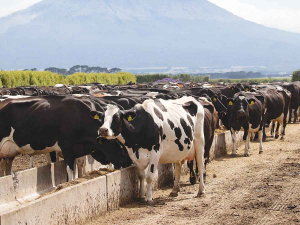Don't reduce supplementary feed
As the new dairy season gets underway and farmers tackle ongoing financial challenges, they are being urged not to make hasty decisions about selling cows and cutting back on supplementary feed.
 Keith Arnold, Graincorp Feeds' national operations manager, says he's seen quick fixes to supply chain problem have major ramifications.
Keith Arnold, Graincorp Feeds' national operations manager, says he's seen quick fixes to supply chain problem have major ramifications.
Over the last three years almost every industry has faced upheaval.
As Covid disrupted lives, a succession of dominos toppled, starting with the global workforce. With workers down, every link of every supply chain was affected.
Keith Arnold, national operations manager at GrainCorp Feeds, coordinates the importing and distribution of a range of supplementary feed to New Zealand dairy farmers.
Upon arrival, these products must then be transported to liquid and dry storage facilities dotted around New Zealand, located to service each region.
From these storage facilities, Arnold must ensure that some products are dispatched as they are, while others are blended to the requirements of individual farmers. Once blended, these customised feeds must then be transported to farmers.
That’s a lot of moving parts.
To say that Arnold’s job is now more difficult is an understatement. Far from perplexed, he’s loving the challenge.
“I’m a natural problem-solver, so I’m like a pig in mud when there’s a puzzle to be solved. Not everyone likes handling lots of moving parts, but I actually need it.”
Because the company sells products from both locally and around the globe, synchronising the arrival of these ingredients is a supply-chain challenge. There are bulk liquid tankers to manage, bulk dry ships carrying dry feed, and container ships carrying bulk feeds and additives.
With so many links, it is inevitable that there will be challenges. With production deadlines here in New Zealand, it is tempting to reach for whatever quick fix will get the job done.
But even when a rapid intervention is required, Arnold is always mindful of the future consequences.
“I always ask this question: If we take this logistical action now, how will it affect our ability to supply farmers in the future? I’ve seen quick fixes lead to bad ramifications down the track, and those consequences are often relational.
“If you manage to get products supplied today, but do it by burning the relationships you’ll need tomorrow, what have you gained?”
“That’s why I tell my team to let me know if there are any issues putting strain on our key supply chains.”
According to the latest Fresh Produce Trend Report from United Fresh, 2026 will be a year where fruit and vegetables are shaped by cost pressures, rapid digital adoption, and a renewed focus on wellbeing at home.
The Roar is a highlight of the game hunting calendar in New Zealand, with thousands of hunters set to head for the hills to hunt male stags during March and April.
OPINION: The past few weeks have been tough on farms across the North Island: floods and storms have caused damage and disruption to families and businesses.
European dairy giant Arla Foods celebrated its 25th anniversary as a cross-border, farmer-owned co-operative with a solid half-year result.
The sale of Fonterra’s global consumer and related businesses is expected to be completed within two months.
Fonterra is boosting its butter production capacity to meet growing demand.
OPINION: Fonterra may be on the verge of selling its consumer business in New Zealand, but the co-operative is not…
OPINION: What does the birth rate in China have to do with stock trading? Just ask a2 Milk Company.